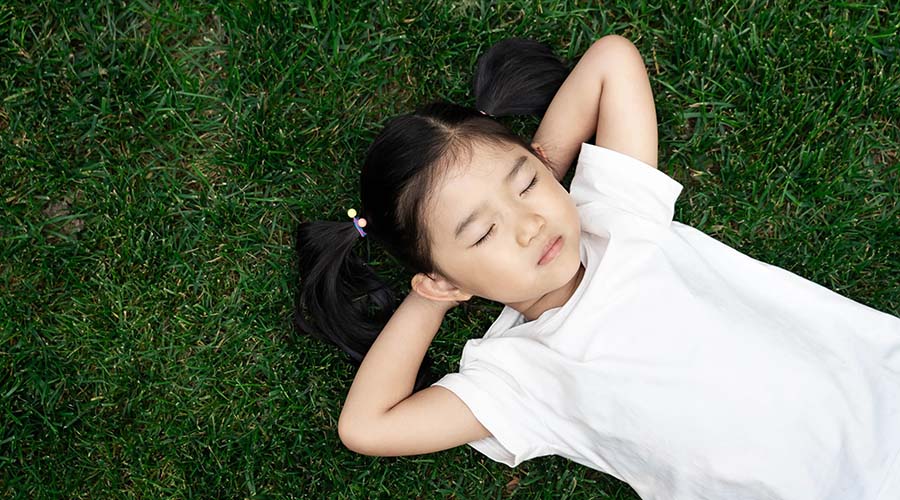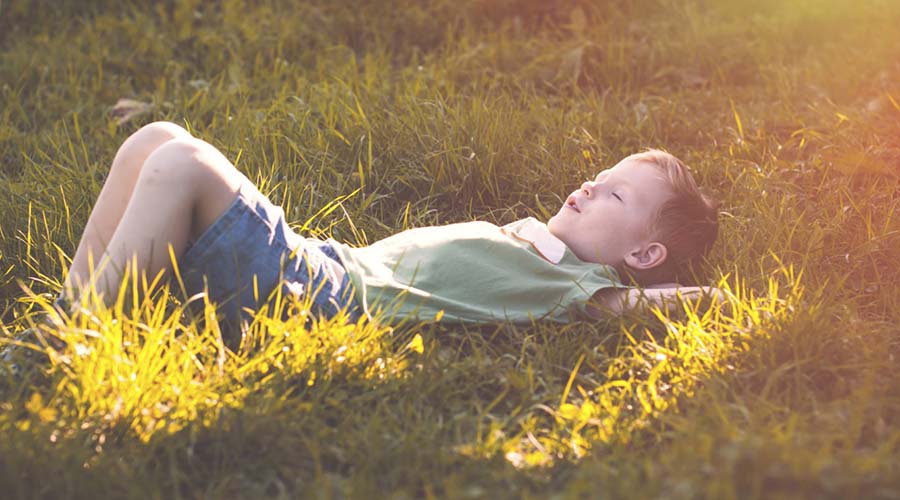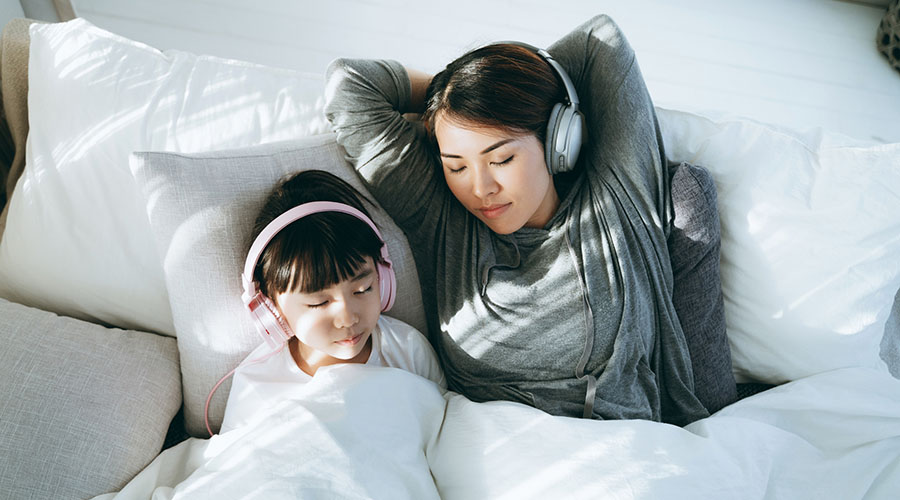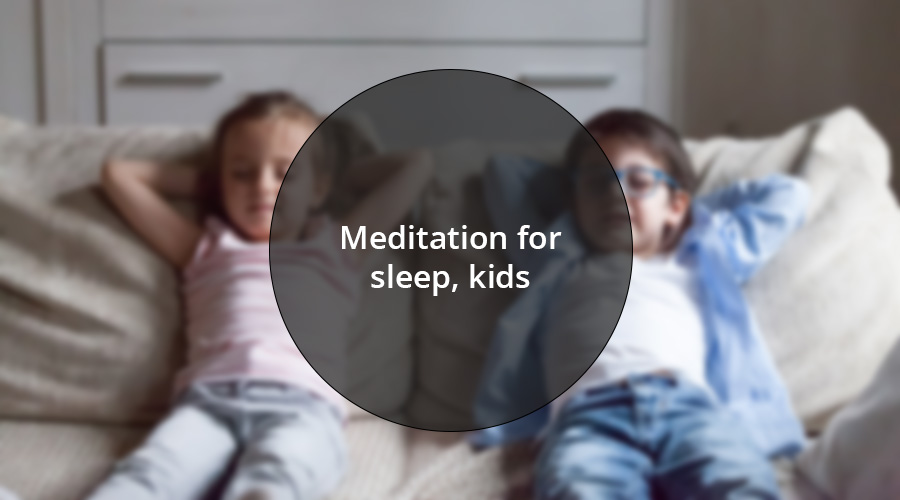There is mounting evidence that meditation can have a wide range of benefits for people of all ages, including children. In fact, studies have found that children as young as 3 years old can benefit from regular meditation. Sleep meditation for kids is a practice that has been shown to promote relaxation and improve sleep. It can help children learn to control their thoughts and emotions, develop focus, and increase their tolerance for stress.
Why sleep meditation works for kids

It is just what it sounds like – a form of meditation that is done before bedtime in order to help promote better sleep. There are a number of different ways to do bedtime meditation, but all generally involve focusing on your breath and calming your mind before bed. It can be especially helpful for kids who have trouble falling asleep or who wake up during the night.
Research has shown that sleep mediation can help improve sleep quality, reduce anxiety and stress, and improve overall mood.
Sleep meditation tips for kids

There are many benefits to sleep meditation for kids, including improved focus, concentration, and memory. Here are some tips for kids to get started:
Give your child a say in their bedtime setting
As parents, we all want our kids to feel comfortable and safe in their own beds at night. But what if we could give our kids a say in how they want to sleep? Parenting expert and author of “The Better Sleep Book” Tara Parker-Pope recommends giving your child the option to have a set bedtime, but also giving them the opportunity to veto certain activities (like watching TV before bed) or requests (like needing a light on in the room).
Encourage kids to co-create a story-based guided meditation
Kids love to create stories, and for many of them, it can be a way to explore their imaginations and communicate with others. Story-based guided meditations are a great way to encourage children to use their imaginations and creativity, while also providing mental and emotional relaxation. According to a study published in the Journal of Positive Behavior Interventions, kids who co-created a story-based guided meditation experienced better moods and coping skills after completing the program. In addition, the kids reported that the meditation helped them connect with their emotions and imaginatively explore different life scenarios.
Choose a voice your child likes hearing

There are many ways to help children fall asleep and get the most restful sleep possible. One way to make bedtime meditation more enjoyable for your child is to choose a voice they like hearing during the meditation. There are many voices available on YouTube that can be used as sleep meditations, so it’s up to you to find the one that sounds the most calming to your child. The platform provides personalized content and ads safe for young audiences when doing meditation.

Accessing online videos you watch for meditation. Depending on your settings, sites like YouTube can be a safe space for younger audiences. Parents may choose contents to use during meditation for their kids and feel comfortable about their sons and daughters accessing sites like these. Sites like YouTube can have recommendations, a customized YouTube space for young audiences.
Be persistent
There is growing evidence that sleeping meditation may be an effective way to help kids in distress. In a study published in The Journal of Alternative and Complementary Medicine, researchers looked at the effects of this type of meditation on anxiety and depression in adolescents with high levels of anxiety and depression. However, establishing meditation practices has to be persistent. After eight weeks of weekly meditation sessions in the study, the majority of participants saw significant reductions in symptoms of anxiety and depression.
Derivation
In conclusion, meditation can help improve sleep quality and duration for both adults and children. It can be a helpful tool to promote relaxation and stress relief, which are known to improve sleep. If you are looking for a natural way to improve sleep, consider adding meditation to your bedtime routine.
FAQ
Does sleep meditation work for kids?
Sleep meditation is a form of mindfulness that can be practiced before bed to help you feel relaxed and fall asleep. It’s been shown to be effective for adults, but does it work for kids? A recent study looked at the effects of this type of meditation on elementary-school-age kids. The results showed that the mediation improved sleep quality, reduced anxiety, and improved attention span and concentration.
How do kids meditate in bed?
Meditation is a practice that has been around for centuries and is often used to promote relaxation and stress relief. While there are many different ways to meditate, one popular method is to do so while lying in bed. This can be a great way for kids to wind down before bedtime and get some peace and quiet. Here are a few tips on how to meditate in bed:
- Choose a comfortable position. Lie down with your eyes closed and let your body relax.
- Breathe slowly and deeply. Figure out how long you can keep your mind on one single thing for. Try counting breaths or counting backwards from 10, then take a minute to rest and relax.
- Pick your thoughts. Think about something nice, like the day s events or a favorite memory.
- Don t think about it too much. Think about it for five seconds, and then let it go.
- Repeat this process for 10 minutes or so at bedtime, if possible.
At what age can you teach a child to meditate?
There is no one answer to the question of when a child can be taught to meditate. The answer depends on the child’s age, maturity, and willingness to learn. In general, it is best to start teaching them how to meditate at an early age, before they develop negative habits or attitudes about meditation. However, some children may be ready to learn at a later age. The most important thing is that the child be willing to learn and that the parents are patient and supportive.
Can meditation be used for sleep?
It is no secret that meditation has a plethora of benefits. From reducing stress levels to increasing cognitive function, the practice has shown to be beneficial for people of all ages. But can meditation also be used for sleep? The answer is yes.
There are many different types of meditation, but all have the same goal: to focus and calm the mind. This can be helpful for people who have trouble sleeping because when their minds are racing, they find it difficult to feel relaxed and fall asleep. By meditating before bed, people can learn how to clear their minds and relax, which can lead to a better night’s sleep.
In addition to helping people fall asleep, meditation can also help them stay asleep. People who suffer from insomnia often wake up in the middle of the night and can’t get back to sleep.
Does headspace have meditations for kids?
There are many different types of meditation, and each person may prefer a different type. Some people like to focus on their breath, while others may repeat a mantra or visualize a certain image. If you’re looking for a type of meditation that’s specifically geared toward kids, headspace has several options. They have options tailored to your interests.

